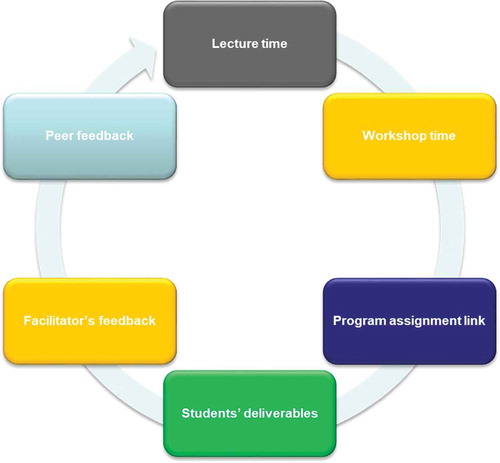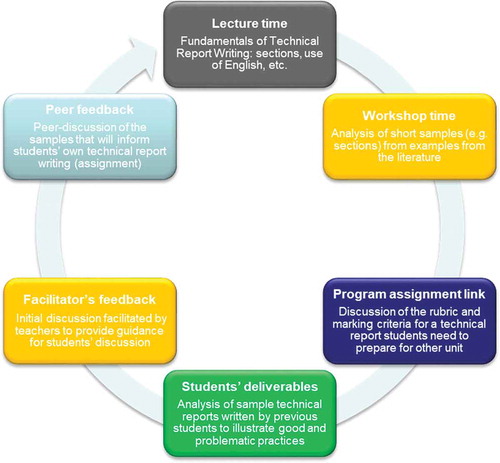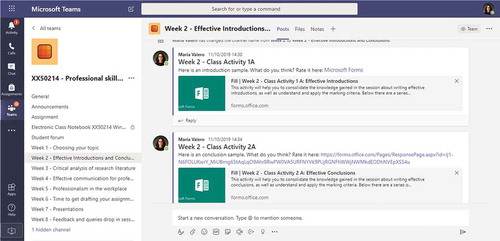ABSTRACT
This paper discusses a practical, multidisciplinary approach used to embed employability skills in a new postgraduate (PGT) Engineering course at the University of Bath. Informed by relevant professional bodies, key transferable skills were identified and embedded in the curriculum with discipline-specific content. Students worked on a series of hands-on activities in which they integrated and applied principles and methodologies from various areas (linguistics, information, etc.), complementary to their technical expertise, as in the working environment. This was facilitated by a multidisciplinary team comprised of Academic and Professional Services staff at the University of Bath. The organisational context and rationale for the approach presented, including the practical implementation and initial outcomes in the new PGT course, are provided.
KEYWORDS:
Organisational and historical context
With rapid advancements and developments in Smart Devices, Internet of Things (IoT), 5 G Technologies, AIs and robots, the development of Electronics graduates who can offer solutions to complex and multifaceted problems is crucial. This requires graduates develop an ample set of skills beyond discipline-related baseline ones (Chetwynd, Aiken, & Jefferis, Citation2018) such as the ability to deal with complex interdependencies, work in multidisciplinary teams, combining information from several sources and linking theory and practice (Huber, Hutchings, & Gale, Citation2005).
In response to this need, the Department of Electronic and Electrical Engineering (DEEE) (University of Bath Department of Electronic and Electrical Engineering, Citation2019) at the University of Bath has increased their provision of specialist MSc programmes, such as the MSc Electronic Systems Design (ESD) (University of Bath Electronic Systems Design MSc, Citation2019), which ran for the first time in the academic year 2017/2018. Focusing on graduates’ employability by giving them key skills, both technical and transferable, to offer solutions to the challenges of the 21st century electronics industry, the development of MSc ESD graduate skills has been supported by a multidisciplinary team of staff from the DEEE and Professional Services from the University of Bath: Careers Services (University of Bath Careers Service, Citation2019), the Library (University of Bath Library, Citation2019) and the Skills Centre (University of Bath Skills Centre, Citation2019).
This paper presents the authors’ work on fully embedding transferable skills (Mohan, Citation2010) – henceforth referred as ‘professional skills’- in the MSc Electronic Systems Design curriculum with an overarching aim to develop and enhance the students’ employability and professional skills, improve academic performance and graduates’ prospects. Section 2 presents the rationale and pedagogical approach for this methodology, whose implementation is discussed in Section 3. Section 4 presents the preliminary evaluation of the methodology after its implementation in the MSc ESD and an analogous, cross-departmental unit at the Faculty of Engineering & Design at the University of Bath. Finally, conclusions and future work are presented in Section 5.
Rationale and pedagogical approach
The need for Professional/Employability skills training
As highlighted in the Institution of Engineering and Technology (IET) annual ‘Skills and Demand in Industry’ Survey (Institution of Engineering and Technology Skills & Demand in Industry Survey, Citation2017), despite a rise in demand for engineering staff, UK employers find that many new engineering graduates have significant skills deficiencies. In fact, Engineering UK’s 2018 report on the state of Engineering reported that 61% of businesses ‘expressed a lack of confidence that there will be enough people available in the future with the necessary skills to fill their high-skilled job vacancies’ (EngineeringUK, Citation2018). This epitomises the concerns of STEM employers in UK and Europe around graduate skills gaps (Wakeham, Citation2016).
Engineer graduates skills portfolio
As identified in the QAA benchmark statement for Engineering (The Quality Assurance Agency for Higher Education, Citation2015), among others, engineering graduates should:
be pragmatic, taking a systematic approach and the logical and practical steps necessary for, often complex, concepts to become reality [1];
seek to achieve sustainable solutions to problems and have strategies for being creative, innovative and overcoming difficulties by employing their skills, knowledge and understanding in a flexible manner [2];
be skilled at solving problems by applying their numerical, computational, analytical and technical skills, using appropriate tools [3];
be risk, cost and value-conscious, and aware of their ethical, social, cultural, environmental, health and safety, and wider professional responsibilities [4];
be able to formulate and operate within appropriate codes of conduct, when faced with an ethical issue [5];
be professional in their outlook, be capable of team working, be effective communicators, and be able to exercise responsibility and sound management approaches [6].
This requires graduates to possess:
information skills to acquire relevant and diverse knowledge, putting this into practice in a flexible and creative manner [2], using their analytical and technical skills [3] in order to solve complex problems [1];
communication skills that will enable students to work in teams, with the essential time and work management skills to be successful in their projects; and an ability to communicate effectively with both specialist and non-specialist audiences [6].
criticality and reflection skills required for ethical, social, cultural, and environmental awareness of own professional responsibilities [4] and practice, which is compliant with appropriates codes of conduct, health and safety and Ethics [5].
Embedding Professional/Employability skills in the curriculum
Substantial research indicates that the development of academic skills is most effective when it is successfully integrated into course design (Huijser, Kimmins, & Galligan, Citation2008). In addition to improving student engagement and motivation, discipline-based skills provision enhances the efficacy of skills acquisition, ultimately improving graduates’ likelihood of securing high-skilled jobs (Fahnert, Citation2015; Heaviside, Manley, & Hudson, Citation2018). In fact, improving job prospects is a major motivator for students to pursue university qualifications (Bhardwa, Citation2017; Lowden, Hall, Elliot, & Lewin, Citation2011; Wells, Citation2011).
Need for curriculum alignment
Curriculum alignment at programme level, with constructive coherence between teaching, learning, and assessment, is crucial for the quality of teaching and learning (Biggs, Citation2011; Wijngaards-De Meij & Merx, Citation2018). Through constructive alignment, student learning is optimised with intended learning objectives turned into actual learning outcomes through meaningful activities (Azcona, Valero, Medrano, & Calvo, Citation2014). The understanding of curriculum moves from product-based (Wijngaards-De Meij & Merx, Citation2018) to the co-construction of knowledge between student and facilitator (Fink, Citation2013).
Need for integrative learning
From the accelerated emergence of transdisciplinary technologies such as information, nano- and bio-technology to multifaceted challenges such as resource-efficient sustainable production, today’s world of work is moving to the age of synthesis (Cai, Citation2011). 21st century Electronic Engineers -and STEM professionals in general- have to synthesize information and apply ideas from multiple disciplines to develop new understanding and solutions (Nadge, Citation2005). Learning becomes a constructive process (Bruning, Schraw, & Norby, Citation2011) in which students need to integrate and apply the principles and methodologies from multiple areas different to their expertise.
Need for experiential learning
Whilst still widely used as the main method for knowledge dissemination in many universities (Beckem, Citation2012; Wakeham, Citation2016), traditional teaching methods may be not be the most effective method for students to learn (Freeman et al., Citation2014). In fact, the skills required within employment based on experiential learning may amount up to 90% (Nadge, Citation2005). This experiential approach enables an active and constructive learning process. The instructor becomes a facilitator (Grasha, Citation1994) and students construct their own understanding and knowledge through doing and reflection (Bada & Olusegun, Citation2015).
Implementation
Design considerations
Historically, the provision of professional skills for MSc DEEE programmes has been mostly delivered through general, faculty-wide workshops and drop-in sessions and activities led by Professional Services staff, usually with limited input of academics.
Research studies have pointed out that generalised approaches such as remedial and limited one-to-one support mentioned above ‘are less likely to be effective than those targeted at specific aspects of learning within the academic courses in which the need for knowledge or skills becomes apparent’ (Huijser et al., Citation2008).
We therefore designed our new integrated approach based on the rationale set out in section 2, with an aim to overcome some of the issues identified with the more conventional methods of skills provision currently offered on MSc DEEE degree programmes.
Curriculum alignment
By identifying key discipline-specific skills (Section 2), we produced a tailored skills portfolio that is fully integrated into the structure and content of the programme. This skills-set approach helps to align the needs of all stakeholders through a relevant, subject, topic and assignment-specific skills syllabus with desirable and achievable intended learning outcomes directly linked to academic and employability gains (Cox & King, Citation2006).
Integrative learning
As discussed in Section 2, Electronic graduates are required to integrate and apply principles and methodologies from multiple areas (linguistics, information, etc.) in addition to their technical expertise. Session design as well as co-delivery by a multidisciplinary team of professional (employability/professional skills focus) and academic (technical skills focus) staff can facilitate this process.
Student evaluations from previous courses highlighted that the direct involvement of the academic in both design and delivery stages could further enhance student engagement with skills development and acquisition, as this facilitates:
a perception of endorsement and authority, elevating the value and importance of the skills unit;
the co-construction of knowledge between student and diverse facilitators.
We decided therefore that the unit should be co-delivered, and worked to design a professional skills unit with subject-informed, relevant and up-to-date skills content and learning outcomes.
Experiential learning
A key objective of the new approach was to enable students to become active agents in their own learning process, so their skills development and improvement are seen as a shared responsibility between facilitators and students (Huijser et al., Citation2008).
Research (Thomas, Citation2012) and student evaluations from previous embedded courses across the university indicated that successful engagement requires:
Relevance: aligning skills topics with specific coursework and assignments in the programme;
Timeliness: delivering skills at optimum needs-must points during the academic year, i.e. aligning skills topics with coursework and assignment deadlines.
Content & delivery
Sessions were carried out through both semesters 1 and 2 (). Semester 1 content focused on providing students with the basic skills toolkit to support learners’ academic development. Semester 2 shifted to skills practice, enabling students to build on and practice the skills acquired in semester 1 in a real-world (project) setting.
Figure 1. Employability/Professional skills provision in the MSc electronic systems design throughout the academic year (semesters 1 and 2)
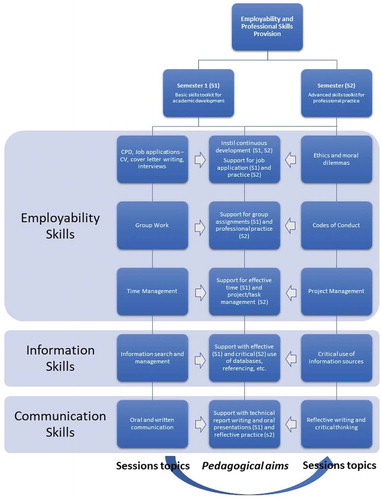
Semester 1
Semester 1 content was input-focused to provide students with a ‘nuts-and-bolts skills toolkit’ to scaffold skills acquisition to apply in academic assignments. The concept of scaffolding is based on Vygotsky’s socio-cultural theory of learning (Vygotsky, Citation1980), which has been utilised in schools and HE for many years. Studies by Pol (Citation2010) and Stone (Citation1998) define scaffolding as a means of providing support for the construction, extension or development of knowledge and skills. Scaffolding can also ensure step-by-step skills acquisition and effective application, facilitating a shift in focus and responsibility for learning from the tutor to the student (Pol, Citation2010).
shows the general structure of the Employability/Professional skills sessions, which comprises:
Lecture time: each session was informed by subject specific content, which aimed to provide the foundations of student learning;
Workshop time: students worked on short tasks and exercises that served to provide concept checking, practice and review of input;
Programme assignment link: sessions were organised content and time-wise with specific, relevant assignments within the unit or programme. Alongside better alignment between teaching, learning and assessment, this facilitated a better understanding of the assessment rubric and marking criteria.
Students’ deliverables: students were provided with anonymised work samples of previous years’ students. These were used to illustrate good and problematic practices, facilitating discussion and evaluation and helping students develop their assessment literacy by recognising what good work looks like.
Facilitator’s feedback: discussion was initially facilitated by teachers, to provide guidance to students for following peer review and discussion;
Peer feedback: pair and group working helped to improve individual participation, group cohesion and peer support, and facilitate the shift in learning responsibility from tutor to student, who could apply all the above to the creation of their own products for the assignment;
shows how this structure is applied to the Employability/Professional skills sessions regarding Communication Skills – Technical Report Writing.
Semester 2
In semester 2, a workshop approach was adopted, shifting focus from input to output and application. The ESD group project (University of Bath EE50225: Electronic systems design project, Citation2019) provided a suitable framework for students to practice many of the skills acquired in semester 1 in a real-world scenario.
In the ESD group project, students in groups design an electronic system to a specification in order to achieve a set of design goals. Assessment comprises an oral group presentation, a lab demonstration, a group technical report and an individual reflective report.
To succeed in their group project (), students were required to apply and build on the knowledge and skills developed during semester 1. Key skills, such as information and communication skills were revisited and extended. New competencies such as critical and reflective thinking and practice were developed and applied to new topics (Ethics, Codes of Practice) and contexts (group project):
Information skills. Students built on the prerequisite skills from semester 1; finding and selecting appropriate sources, and examining in detail what it means to be critical. This involved exploring and developing skills for judging, selecting and prioritising the most appropriate sources from a literature search, reading skills for scanning and note-taking to facilitate an evaluative assessment of the quality of the content and its utility for their written work. Sample workshop activities included a series of linked individual and paired activities analysing pre-selected abstracts then full papers, comparing and contrasting their relevance and utility for the scope of their project and assignment (such as the group technical report).
Communication skills. Skills content focused on the reflective report assignment, which was informed by the sources critically analysed on the information skills provision sessions. Semester 2 sessions on communication skills delivered input on reflective practice and writing, with models and examples to highlight good practice and provide students with an attainment standard. Sample workshop activities included students working in groups unpacking and analysing model answers.
Employability skills: Ethics and Codes of Conduct/Practice. In practical workshops, students worked in groups on an ethics in engineering problem. The sessions were designed to facilitate critical thinking and analysis, problem-solving and decision-making developed in the previous sessions. Namely, students faced the difficulties and issues they may encounter when making complex, real-world decisions rather than reaching abstract academic conclusions. The task also raised awareness of professional standards frameworks and the complexities of ethics in real world scenarios, which were reviewed and analysed for their own discipline and emerging professional identity.
Figure 4. Electronic design project phases. Key skills (e.g., information and communication skills) are revisited and extended by the development of new competencies (e.g., critical and reflective thinking and practice). Skills are integrated and applied to new topics (e.g., Ethics, Codes of Practice) and contexts (group project)

Preliminary evaluation
Running for its third time at the time of writing (March 2020), efforts have largely focused on the development and implementation of the proposed methodology, which is carried out in two main phases:
Phase 1: Pilot stage. Implementation and preliminary evaluation of the proposed methodology in a single programme, the MSc ESD.
Phase 2: Expansion stage. Implementation and preliminary evaluation of the provision for large classes and multiple programmes.
Phase 1: pilot stage (academic years 2017-2018 and 2018-2019)
The first phase of the evaluative process focused primarily on the relevance, usefulness and adequacy of the Employability/Professional skills provision. A holistic approach was adopted throughout, accounting for internal (students and staff) and external (internship providers and employers) perceptions and views:
Relevance and usefulness- Is the designed provision deemed as significant by the learning (students) and teaching (staff) community?
Adequacy – Does the designed provision accomplish its main pedagogical purpose (i.e., employable graduates) from a professional/employers perspective?
Relevance and usefulness
Student feedbackFootnote1 showed high satisfaction rates, with content considered relevant and helpful, namely when applying for a job/internship (from now on referred to as placement). The multidisciplinary approach was seen as a key strength by all student cohorts (2017/2018 and 2018/2019). Endorsement of the programme’s success is evidenced by the adoption of the model for the faculty -level PGT employability skills course that ran in 2018.
Adequacy
Ultimately, the main aim is to develop and enhance the students’ employability and professional skills to improve their graduates’ prospects. To evaluate the adequacy of the proposed approach, the MSc ESD graduates’ competencies and employability were considered and evaluated from a professional/employers perspective, where the following criteria were considered:
Feedback from placement providers. Testimonials from placement providers about our students () were positive.
MSc ESD graduates’ employment success after completion of the programme. After their graduation (July 2019), our first cohort of students (2017/2018) were already working in their area of expertise as electronic embedded systems, control systems, hardware engineers in diverse fields, including microelectronics, healthcare and aviation, from start-ups to multinational companies such as ARM and Dyson.
Figure 5. Tweet from one of our placement providers (Bristol is Open) talking about their experience with one of our MSc electronic systems design graduates as an intern (placement) at their company. Link: https://twitter.com/bristolisopen/status/1085831933118955521
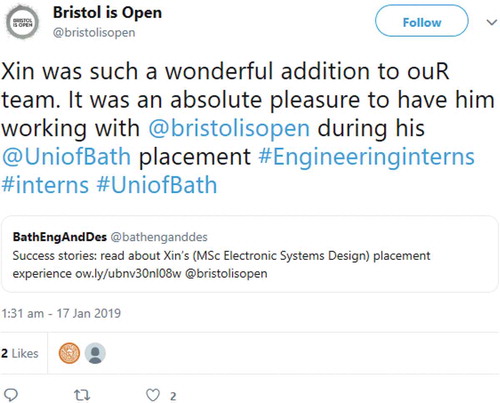
Phase 2: expansion stage (academic year 2019-2020)
After the preliminary validation of its relevance, usefulness and adequacy, the proposed methodology was adapted for its delivery on large classes and/or multiple programmes, such as in the MSc unit XX50214: Professional skills for engineering practice (University of Bath XX50214: Professional skills for engineering practice, Citation2020). Lead by the Department of Mechanical Engineering, XX50214 is a faculty-level postgraduate unit taken by students from three different departments in the Faculty of Engineering & Design at the University of Bath:
Department of Architecture & Civil Engineering: MSc Civil Engineering: Innovative Structural Materials
Department of Electronic & Electrical Engineering: MSc Mechatronics
Department of Mechanical Engineering: MSc Automotive Engineering and MSc Engineering Design
Typical cohort sizes for XX50214 rage from 60 to 80 students, which made translating key features of the proposed methodology, such as those relying on class interaction and monitoring of student progress, challenging. To address this, Microsoft Teams (Microsoft Teams, Citation2020) was used alongside the existing VLE course (Moodle). Unlike VLEs, mostly conceived as an educational tool only, Microsoft Teams (now referred as ‘Teams’) is a unified communications platform for the workplace combining chat, video meetings, file storage, etc. widely used in professional settings.
Introduced to the University of Bath in summer 2019 as part of the Office 365, toolkit Office 365 Office 365 (Citation2020), Teams provides students with a valuable tool to engage with learning material as well as communicate and interact with peers and staff. Besides a chat and instant messaging function, Teams provides a digital space (Class Notebook) for each student in the Team/course for collecting course notes and reflections, coursework preparation and planning, etc.
Implementation and initial evaluation in large-class & multi-programme settings
The XX5014 Teams space () was organised so that each week had its own dedicated space or channel (). During lecture time, students worked on bespoke activities related to the content being taught. Microsoft Forms (Microsoft Forms, Citation2020) was used for collecting students’ response and views (polling).
Figure 7. The XX50214 Microsoft Team space was structured into several Channels to facilitate activities and communication over eight weeks
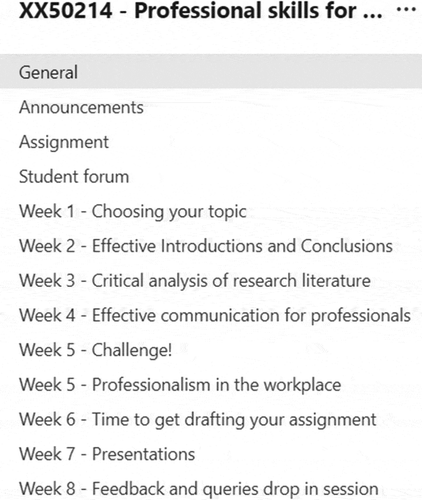
Microsoft Forms was also used for a series of post-session activities to reinforce learning and help students to prepare a technical report (80% of the final mark). Each student was provided with their own Class Notebook (). Based in the software OneNote (OneNote, Citation2020), this provided each student with a private space to make notes during the class, prepare for their assignments and reflect on their own learning. Four students were commended for their use of this feature.
Figure 8. Example of the Class Notebook of one of the students in XX50214, as seen by the facilitators
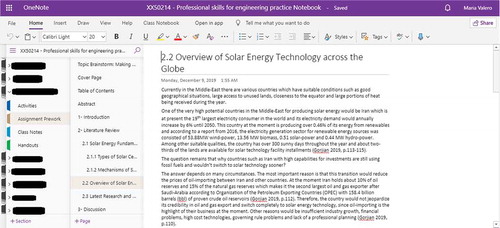
Participation in the activities above (post-session activities and Class Notebook) accounted for 20% of the final mark. Used as the evidence of continuous and active engagement with the unit, this was used to appraise the development of students’ skills and abilities such as critical analysis and reflection, workload planning, etc., as well as the assimilation of concepts taught.
The 2019/2020 cohort comprised 81 students. 67% of the students were active members of the Teams area, posting and engaging in group and class discussions (). Homework () and class () activities saw a high level of engagement, although the latter tailed off towards the end. This was reflected on the student attendance to class (), which nonetheless was significantly increased compared to previous years.
Figure 9. A chart illustrating active student participation in the XX50214 Microsoft Team for professional skills. The chart shows the number of posts made by a student, either to the whole team or privately to another person. Those students who did not make any posts (n = 27) are not included
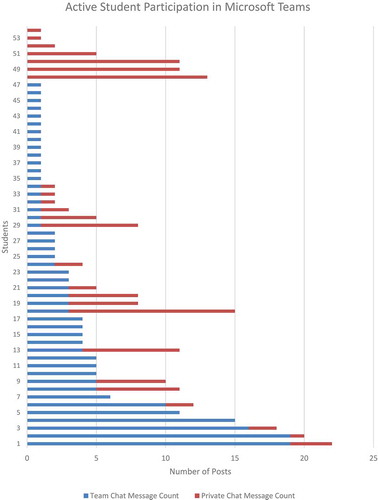
Figure 10. A chart to show the student responses to the homework activities presented in MS Forms and delivered through the XX50214 Microsoft Team
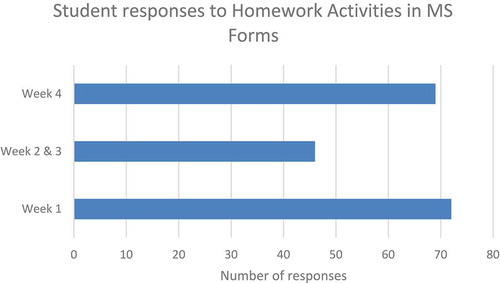
Figure 11. A chart to show student responses to the class activities presented in Microsoft Forms and delivered through the XX50214 Microsoft Team
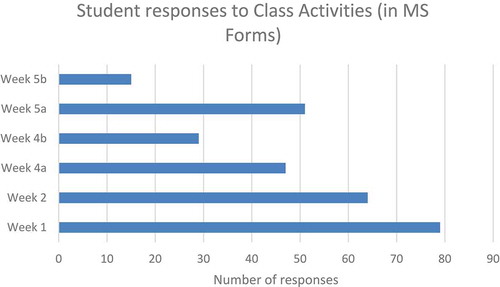
Figure 12. Student attendance of XX50214 over the last academic years, at the beginning (week 2) and towards the end of the course (week 7)
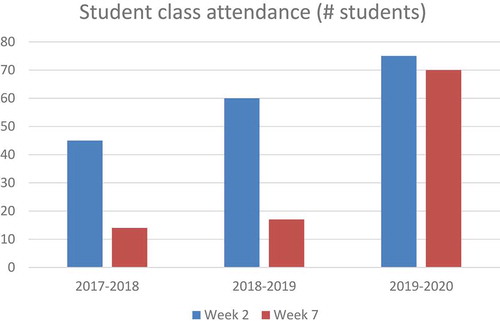
Student evaluation surveys1 for the unit (2019/2020) did not reveal any significant opinion about using Teams for this activity. One student commented that there was some confusion working across multiple tools (i.e. Teams and Moodle) but this is not surprising as staff and students were using the new tool for the first time.
Conclusions and future work
With only a few iterations run and evaluation still ongoing (Phase 2), it is difficult to draw definitive conclusions at this stage. Nonetheless, the positive outcomes for the initial evaluation phase uphold the suitability of the skills provision, thus supporting further developments and analysis of the proposed methodology.
Further developments on the skills provision and methodology
Professional skills and practice fully embedded in other (PGT) programmes
At the time of writing (March 2020), the University of Bath is going through the review and curriculum transformation of all UG and PGT courses (Learning and Teaching Hub @Bath, Citation2019a), to deliver Higher Education for the next generation of graduates. One of the key principles is to integrate professional and transferable skills (Learning and Teaching Hub @Bath, Citation2019b) as well as build on existing success. Currently, we are working to develop a Professional Skills and Practice unit/module that can be embedded on all PGT Engineering degree programmes post-curriculum transformation.
A more encompassing Employability/Professional skills provision
Deepening criticality and reflection: developing evaluative judgement. With rapid changing technology and a more globalized economy, critical thinking and reflection are highly desired skills for graduates (Roohr, Citation2019). Among these competencies, evaluative judgement (Tai, Citation2018) can play a major role in the work environment, when an appraisal and an understanding of standards or quality of own and other’s work is required (Tai, Citation2018). We are revising our current practices to include additional content and activities, such as student co-creation of rubrics (Fraile, Panadero, & Pardo, Citation2017), which can support the development of this competency.
Developing an Employable mind-set. Individuals perceiving themselves as employable are more likely to secure employment, as they tend to engage in positive behaviours that will lead to gain employment (Forsythe, Citation2017). A lifelong-development mind-set and resilience are seen as key ‘employability’ attributes in the workplace (Römgens, Scoupe, & Beausaert, Citation2019). Working with staff from Student Services at Bath (University of Bath Student Services, Citation2019) we are exploring ways of helping graduates to develop this set of competences. Namely, as part of the Professional Skills provision in the MSc ESD, we have run sessions on resilience co-delivered with staff from Student Services. Currently, we are looking into how to increase our provision for future years.
Further analysis on the proposed methodology
More substantive data will be collected to extend and deepen our analysis and improve the delivery (e.g., on the use of tools such as Teams and VLEs to maximise student engagement) and its efficacy. With regards the latter, this will focus on learning gain and consider aspects such as self-efficacy, self-assessment skills, peer-instruction gains and peer-instruction confidence gains (Arico, Gillespie, Lancaster, Ward, & Ylonen, Citation2018).
As discussed, confidence plays a significant role in the development of an ‘employable mind-set’ and thus the likelihood to secure employment (a major goal for graduates). Self-efficacy (Arico et al., Citation2018), measured as student self-reported confidence in performance, has been identified as one key learning gain indicator (ibid). Without a unique, definitive method to assess learning gain (Evans, Kandiko Howson, & Forsythe, Citation2018), self-efficacy stands a relevant metric for:
Holistic evaluation of this methodology. Through a series of questionnaires, a self-diagnostic tool (Learning and Teaching Hub @Bath, Citation2019c) recently developed in Bath will enable students to self-assess their confidence on their employability/professional skills performance. These results can be then compared with student’ academic performance (self-assessment skills indicator).
Pedagogical enhancement. As explained, future development plans such as “Developing an Employable mind-set focus on developing a set of ‘employability’ competences to increase student confidence levels on their employability. Self-efficacy and self-assessment skills measurements will enable to determine the overall impact of the skills provision in terms of facilitator delivery, with the peer-learning component assessed via peer-instruction gains and peer-instruction confidence gains. This data will evaluate and inform any necessary pedagogical enhancements for the future.
Acknowledgments
The authors would like to Dr Tracey Madden, Mr Thomas Rogers, Ms Sandra Haywood, Dr Helen Liang, Dr Joshua Lim, Mr Anthony Payne and Dr Eleanor Parker for their support to the implementation of this methodology.
Disclosure statement
No potential conflict of interest was reported by the authors.
Notes
1. Student feedback was collected through University mechanisms such as unit evaluations (University of Bath Unit Evaluations, Citation2019) and comments are covered by consent and secured in accordance with the General Data Protection Regulation.
References
- Arico, F., Gillespie, H., Lancaster, S., Ward, N., & Ylonen, A. (2018). Lessons in learning gain: Insights from a pilot project. Higher Education Pedagogies, 3(1), 249–265. doi:10.1080/23752696.2018.1454845
- Azcona, C., Valero, M.R., Medrano, N., & Calvo, B. (2014). Diploma in microsystems and intelligent instrumentation: The final project as career development learning (pp. 1–7).
- Bada, S.O., & Olusegun, S. (2015). Constructivism learning theory: A paradigm for teaching and learning. Journal of Research & Method in Education, 5(6), 66–70.
- Beckem, J.M., II. (2012). Bringing life to learning: Immersive experiential learning simulations for online and blended courses. Journal of Asynchronous Learning Networks, 16(5), 61–71.
- Bhardwa, S. (2017). Why do students go to university and how do they choose which one? Times Higher Education. Retrieved from https://www.timeshighereducation.com/student/news/why-do-students-go-university-and-how-do-they-choose-which-one
- Biggs, J.B. (2011). Teaching for quality learning at university: What the student does (4th ed.). Maidenhead: Open University Press.
- Bruning, R.H., Schraw, G.J., & Norby, M.M. (2011). Cognitive psychology and instruction (5th ed.). Boston: Pearson.
- Cai, S. (2011). The age of synthesis: From cognitive science to converging technologies and hereafter. Chinese Science Bulletin, 56(6), 465–475. doi:10.1007/s11434-010-4005-7
- Chetwynd, F., Aiken, F., & Jefferis, H. (2018). Reflections on the 2017 HEA STEM conference: Graduate employability challenges and solutions. Higher Education Pedagogies, 3(1), 490–494. doi:10.1080/23752696.2018.1462094
- Cox, S., & King, D. (2006). Skill sets: An approach to embed employability in course design. Education + Training, 48(4), 262–274. doi:10.1108/00400910610671933
- EngineeringUK. (2018). Engineering UK report 2018: Synopsis and recommendations. Retrieved from https://www.engineeringuk.com/media/1576/7444_enguk18_synopsis_standalone_aw.pdf.
- Evans, C., Kandiko Howson, C., & Forsythe, A. (2018). Making sense of learning gain in higher education. Higher Education Pedagogies, 3(1), 1–45. doi:10.1080/23752696.2018.1508360
- Fahnert, B. (2015). On your marks, get set, go!—lessons from the UK in enhancing employability of graduates and postgraduates. FEMS Microbiology Letters, 362(19), fnv150. doi:10.1093/femsle/fnv150
- Fink, L.D. (2013). Creating significant learning experiences: An integrated approach to designing college courses (2nd ed.). San Francisco: Jossey-Bass.
- Forsythe, A. (2017). I doubt very seriously whether anyone will hire me; factors predicting employability perceptions in higher education. Cogent Psychology, 4(1), 1–13. doi:10.1080/23311908.2017.1385131
- Fraile, J., Panadero, E., & Pardo, R. (2017). Co-creating rubrics: The effects on self-regulated learning, self-efficacy and performance of establishing assessment criteria with students. Studies in Educational Evaluation, 53(C), 69–76. doi:10.1016/j.stueduc.2017.03.003
- Freeman, S., Eddy, S.L., McDonough, M., Smith, M.K., Okoroafor, N., Jordt, H., & Wenderoth, M.P. (2014). Active learning boosts performance in STEM courses. Proceedings of the National Academy of Sciences, 111(23), 8410–8415. doi:10.1073/pnas.1319030111
- Grasha, A.F. (1994). A matter of style: The teacher as expert, formal authority, personal model, facilitator, and delegator. College Teaching, 42(4), 142–149. doi:10.1080/87567555.1994.9926845
- Heaviside, H.J., Manley, A.J., & Hudson, J. (2018). Bridging the gap between education and employment: A case study of problem-based learning implementation in Postgraduate sport and exercise psychology. Higher Education Pedagogies, 3(1), 463–477. doi:10.1080/23752696.2018.1462095
- Huber, M.T., Hutchings, P., & Gale, R. (2005). Integrative learning for liberal education. Peer Review, 7(4), 4–8.
- Huijser, H., Kimmins, L., & Galligan, L. (2008). Evaluating individual teaching on the road to embedding academic skills. Journal of Academic Language and Learning, 2(1), A23–A38.
- Institution of Engineering and Technology. (2017). Skills & Demand in Industry. 2017 survey. Retrieved from https://www.theiet.org/media/1362/2017-skills-survey-infographic.pdf.
- Learning and Teaching Hub @Bath. (2019a). Curriculum transformation. Retrieved from https://teachinghub.bath.ac.uk/curriculum-transformation/.
- Learning and Teaching Hub @Bath. (2019b). Curriculum transformation - principles. Retrieved from https://teachinghub.bath.ac.uk/curriculum-transformation/curriculum-transformation-principles/.
- Learning and Teaching Hub @Bath. (2019c). A new diagnostic tool for teaching and learning. Retrieved from https://teachinghub.bath.ac.uk/events/demonstration-event-a-new-diagnostic-tool-for-teaching-and-learning/.
- Lowden, K., Hall, S., Elliot, D., & Lewin, J. (2011). Employers’ perceptions of the employability skills of new graduates. Retrieved from https://curve.coventry.ac.uk/cu/file/2dea66b1-301a-4abb-97e5-8cbb0012bee5/1/Employers%20Perceptions%20of%20the%20Employability%20Skills%20of%20new%20graduates.pdf.
- Microsoft Forms. (2020). Microsoft forms. Retrieved from https://forms.office.com/
- Microsoft Teams. (2020). Microsoft teams. Retrieved from https://products.office.com/en-gb/microsoft-teams/group-chat-software
- Mohan, A. (2010). Professional skills in the engineering curriculum. IEEE Transactions on Education, 53(4), 562–572. doi:10.1109/TE.2009.2033041
- Nadge, A. (2005). Academic care: From research to reality. Independent Education, 35(2), 30–32.
- Office 365. (2020). Office 365. Retrieved from https://www.office.com/
- OneNote. (2020). OneNote. Retrieved from https://products.office.com/en-gb/onenote/digital-note-taking-app
- Pol, J.V.D. (2010). Scaffolding in teacher-student interaction: A decade of research. Educational Psychology Review, 22(3), 271–297. doi:10.1007/s10648-010-9127-6
- Römgens, I., Scoupe, R., & Beausaert, S. (2019). Unraveling the concept of employability, bringing together research on employability in higher education and the workplace. Studies in Higher Education, 1–16. doi:10.1080/03075079.2019.1623770
- Roohr, K. (2019). A multi-level modeling approach to investigating students’ critical thinking at higher education institutions. Assessment & Evaluation in Higher Education, 44(6), 946–961. doi:10.1080/02602938.2018.1556776
- Stone, C.A. (1998). The metaphor of scaffolding: Its utility for the field of learning disabilities. Journal of Learning Disabilities, 31(4), 344–365. doi:10.1177/002221949803100404
- Tai, J. (2018). Developing evaluative judgement: Enabling students to make decisions about the quality of work. Higher Education (00181560), 76(3), 467–482. doi:10.1007/s10734-017-0220-3
- The Quality Assurance Agency for Higher Education. (2015). Subject benchmark statement: Engineering. UK quality code for higher education, part A: Setting and maintaining academic standards. Retrieved from https://www.qaa.ac.uk/docs/qaa/subject-benchmark-statements/sbs-engineering-15.pdf?sfvrsn=f99df781_10.
- Thomas, L. (2012). Building student engagement and belonging in higher education at a time of change: Final report from the What Works? Student retention & success programme. Retrieved from https://www.heacademy.ac.uk/system/files/what_works_final_report.pdf.
- University of Bath Careers Service. (2019). Careers service. Retrieved from https://www.bath.ac.uk/professional-services/careers-service/.
- University of Bath Department of Electronic & Electrical Engineering. (2019). Department of electronic & electrical engineering. Retrieved from https://www.bath.ac.uk/departments/department-of-electronic-electrical-engineering/.
- University of Bath EE50225: Electronic systems design project. (2019). EE50225: Electronic systems design project. Retrieved from http://www.bath.ac.uk/catalogues/2018-2019/ee/EE50225.html.
- University of Bath Electronic Systems Design MSc. (2019). Electronic systems design MSc. Retrieved from https://www.bath.ac.uk/courses/postgraduate-2019/taught-postgraduate-courses/msc-electronic-systems-design-including-three-month-placement/.
- University of Bath Library. (2019). Library facts and figures. Retrieved from https://www.bath.ac.uk/corporate-information/library-facts-and-figures/.
- University of Bath Skills Centre. (2019). Academic Skills Programme (ASP). Retrieved from https://www.bath.ac.uk/professional-services/academic-skills-programme-asp/.
- University of Bath Student Services. (2019). Student services. Retrieved from https://www.bath.ac.uk/professional-services/student-services/.
- University of Bath Unit Evaluations. (2019). Unit evaluations: Information for students. Retrieved from https://www.bath.ac.uk/campaigns/unit-evaluations-information-for-students/.
- University of Bath XX50214: Professional skills for engineering practice. (2020). University of Bath XX50214: Professional skills for engineering practice. Retrieved from http://www.bath.ac.uk/catalogues/2019-2020/me/XX50214.html
- Vygotsky, L.S. (1980). Mind in society: The development of higher psychological processes. Massachusetts: Harvard university press.
- Wakeham, W. (2016). Wakeham review of STEM degree provision and graduate employability. Retrieved from https://assets.publishing.service.gov.uk/government/uploads/system/uploads/attachment_data/file/518582/ind-16-6-wakeham-review-stem-graduate-employability.pdf.
- Wells, P. (2011). The higher education academy (Postgraduate Taught Experience Survey. PTES 2011 report). Retrieved from https://www.heacademy.ac.uk/system/files/ptes_report_2011_0.pdf.
- Wijngaards-De Meij, L., & Merx, S. (2018). Improving curriculum alignment and achieving learning goals by making the curriculum visible. International Journal for Academic Development, 23(3), 219–231. doi:10.1080/1360144X.2018.1462187

